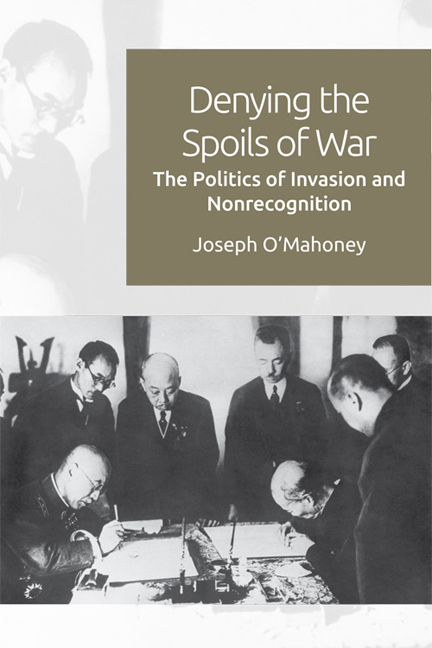Book contents
- Frontmatter
- Contents
- List of Figures and Tables
- Acknowledgements
- List of Acronyms and Abbreviations
- Introduction
- 1 Rule Maintenance: the Logic of Symbolic Sanctions
- 2 The Manchurian Crisis
- 3 The Abyssinian Crisis
- 4 Turkey, Cyprus and the Turkish Republic of Northern Cyprus
- 5 The Independence of Bangladesh
- 6 The Uncertain Fruits of Victory: Variation in Nonrecognition
- Conclusion
- Bibliography
- Index
1 - Rule Maintenance: the Logic of Symbolic Sanctions
- Frontmatter
- Contents
- List of Figures and Tables
- Acknowledgements
- List of Acronyms and Abbreviations
- Introduction
- 1 Rule Maintenance: the Logic of Symbolic Sanctions
- 2 The Manchurian Crisis
- 3 The Abyssinian Crisis
- 4 Turkey, Cyprus and the Turkish Republic of Northern Cyprus
- 5 The Independence of Bangladesh
- 6 The Uncertain Fruits of Victory: Variation in Nonrecognition
- Conclusion
- Bibliography
- Index
Summary
This book asks why states engage in nonrecognition. This chapter presents the theoretical underpinnings of possible answers to this question. In the first section, addressing the question of the purpose of nonrecognition, I discuss different possible purposes to which sanctions could be put. In the second section, I lay out the methodology for the book and explain how the evidence will enable us to choose between the possible answers.
THE LOGIC OF SYMBOLIC SANCTIONS
The norm against aggression seems to be in some sense responsible for the use of nonrecognition. But how, exactly, are the two related? One plausible way would be that actors, believing so strongly in the moral wrongness of aggressive gain, unthinkingly reacted to each instance of aggression with condemnation and social sanctions (Elster 2007: 355–6). This conception relies upon a problematic mechanism: an unthinking reaction to a norm violation. While a common phenomenon in interpersonal relations in everyday life, this mechanism seems implausible when applied to the behaviour of states. This is especially the case when numerous states coordinate and sustain nonrecognition over long periods of time. Even those wholeheartedly convinced of the immorality or undesirability of aggression think strategically about how to enforce or perpetuate the norm against it. A better account of the use of nonrecognition would involve a process of strategically weighing various options when faced with a case of aggression. One of those options is nonrecognition. This still involves a normative position concerning aggression. Actors value a world without war and view the use of international violence for selfish gain as wrong. But their actions taken in pursuit of peace are not unreasoned. So, what might their reasoning be?
Why sanction?
The traditional attitude towards sanctions is that if sanctions are severe or costly enough, they will harm a state's economy, which will bring about pressure on the leaders of that state to change their policy. The goal is inducing policy change. The problem with this line of thought is that sanctions rarely work in this sense, and often seem obviously unlikely to do so (Pape 1997; Morgan and Schwebach 1997). Some work has tried to explain sanctions either as the result of mistakes and miscalculations (Hovi et al. 2005) or, more popularly, because leaders were trying to satisfy the demands of domestic constituents (Lindsay 1986).
- Type
- Chapter
- Information
- Denying the Spoils of WarThe Politics of Invasion and Nonrecognition, pp. 15 - 32Publisher: Edinburgh University PressPrint publication year: 2018

